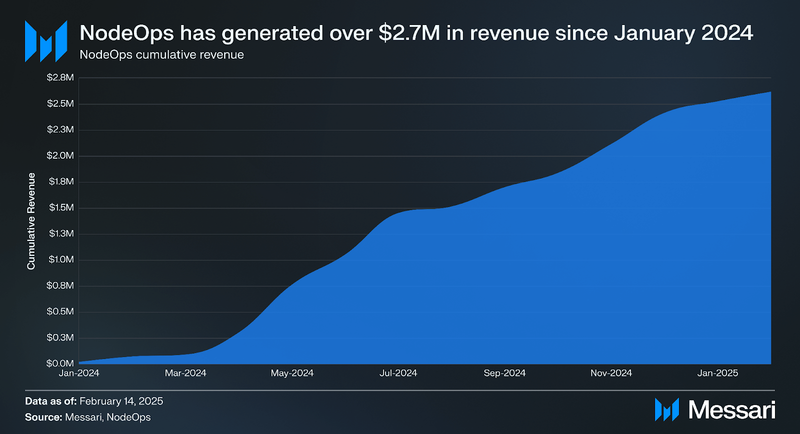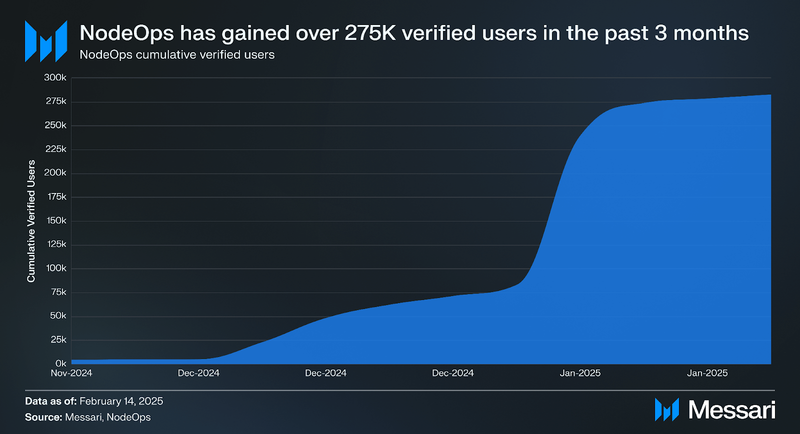and the distribution of digital products.
DM Television
NodeOps: Expanding to Generalized Compute with NodeOps Network
- NodeOps is evolving from a Node-as-a-Service (NaaS) provider to a generalized compute DePIN orchestration layer. This transition expands its market beyond blockchain nodes, positioning it to compete in the growing cloud computing sector.
- The Atlas Network, initially a separate testnet with ~3.4 million registered wallets, is being integrated into NodeOps as NodeOps Network to unify operations under the NodeOps brand. By consolidating infrastructure and reducing fragmentation, NodeOps can leverage Atlas’ technical insights to enhance scalability and performance.
- NodeOps generated ~$2.5 million in annual recurring revenue (ARR) in 2024 and serves ~283,000 verified users and ~56,000 monthly active users from its NaaS console. These metrics mitigate expansion risk as the project moves into generalized computing, providing a solid base for growth.
NodeOps is a decentralized infrastructure marketplace that enables users to purchase, deploy, and manage blockchain nodes with a one-click interface. Since its launch, the platform has supported the creation of over 58,000 nodes across 44 live blockchain networks. NodeOps simplifies blockchain node management by providing a codeless Node-as-a-Service (NaaS) solution, catering to developers, enterprises, and validators.
NodeOps is evolving beyond NaaS into a broader Decentralized Physical Infrastructure Network (DePIN) orchestration layer for generalized compute secured by Autonomous Verifiable Services (AVS). This transition positions the platform to expand beyond blockchain-specific nodes and into the cloud compute sector. By rebranding the Atlas Network testnet to NodeOps Network, NodeOps is consolidating its infrastructure and offering a cloud marketplace for users needing compute power for AI, blockchain, and developer tooling.
Naman Kabra, Pratik Balar, and Chudasama Jagdish co-founded NodeOps in June 2023. In May 2024, NodeOps raised a $5 million Seed Round led by L1D, with participation from Bitscale Capital, Blockchain Founders Fund, Finality Capital, Sandeep Nailwal (Polygon), Jaynti Kanani (Polygon), Rushi Manche (Movement Labs), Richard Ma (Quantstamp), and others.
Website / X (Twitter) / Discord / Telegram
NodeOps' Strategic Evolution
NodeOps emerged in June 2023 as a Node-as-a-Service (NaaS) provider, simplifying blockchain node management. Running a blockchain node typically requires specialized hardware, software configuration, and ongoing maintenance; however, NodeOps streamlined this process, allowing users to deploy and manage nodes seamlessly across multiple blockchain networks. As of February 14, 2025, the platform has generated ~$2.7 million in cumulative revenue and ~$2.5 million in ARR in 2024, scaled to 58,000+ nodes and ~$65.6 million in managed assets, and supports 45+ protocols.
As the Decentralized Physical Infrastructure Network (DePIN) sector gained momentum, NodeOps recognized the opportunity to move beyond specialized compute and into generalized compute orchestration. While specialized compute—such as running blockchain nodes—serves a specific purpose, generalized compute supports a broader range of workloads, including AI model training, decentralized web hosting, and scientific computing. By transitioning into a generalized compute orchestration layer, NodeOps aims to expand its addressable market and leverage its existing infrastructure expertise to meet the growing demand in decentralized cloud computing.
NodeOps NetworkA central component of this transition is the rebranding of Atlas Network as NodeOps Network, which serves as NodeOps’ decentralized compute orchestration layer. Originally launched as a separate testnet in August 2024 by the NodeOps team, Atlas Network was rebranded as NodeOps Network in February 2025. Secured by AVS protocols such as EigenLayer, NodeOps Network leverages the security and consensus mechanisms of restaking protocols to enhance reliability, economic incentives, and trustless coordination. The network provides permissionless access to compute resources, enabling decentralized infrastructure deployment across a geographically distributed network of independent providers. It incorporates Autonomous Verifiable Services (AVS) to ensure security, NodeWatcher for decentralized monitoring, and a marketplace to match compute providers with demand. By transforming Atlas into NodeOps Network, the platform is expanding beyond blockchain nodes into generalized compute services, aligning with its goal of becoming a key infrastructure layer within the DePIN ecosystem.
Securing Compute with EigenLayer AVSNodeOps Network is secured by AVS such as EigenLayer, leveraging third-party Restaking Operators to enhance economic security, verifiability, and network resilience. These operators reuse crypto-economic trust from Ethereum to secure offchain compute operations and are economically incentivized, receiving 15% of the total AVS yield generated and staking rewards.
Within the NodeOps Network, Restaking Operators perform key validation tasks, including:
- Payment Verification – Confirming that subscription payments are valid before deployment begins.
- Rewards Calculation – Determining payouts for compute providers, node operators, and restakers.
- Node Score Calculation – Assessing provider reliability and performance based on uptime and resource usage.
By incorporating EigenLayer’s shared security model, NodeOps Network strengthens its resilience against malicious activity, ensuring a verifiable, economically-aligned decentralized compute marketplace.
Atlas Testnet Success & Evolution into NodeOps Network
Before its rebranding into NodeOps Network, Atlas Network served as a testbed for decentralized compute, showcasing the viability of a permissionless, blockchain-powered cloud infrastructure. As of Feb. 14, 2025, the testnet has:
- ~283,000 verified users
- ~3.4 million total registered wallets (pre-sybil)
- ~56,000 monthly active users
- ~85,400 machines onboarded
- ~23,000 providers onboarded
- ~1,600 active machines
- ~22,800 GB of memory, ~9,000 CPU cores, and ~594,000 GB of storage
- ~$2.7 million in total revenue and ~$2.5 million in Annual Recurring Revenue (ARR) in 2024
This level of adoption validated the demand for a decentralized compute network, leading to Atlas' full rebranding as NodeOps Network.
How NodeOps Network WorksOnboarding Compute Providers & Resource ManagementNodeOps Network operates as an open-access compute marketplace, allowing individuals and organizations to sell compute power. Onboarding is a two-step process:
- Provider Registration – Compute providers stake NODE tokens and verify their infrastructure before joining the network.
- Machine Registration – Machines are onboarded based on their Compute Units (CUs), which measure available CPU, RAM, and storage. Each machine must stake a proportional amount of NODE tokens to ensure reliability.
Providers are incentivized with a revenue-sharing mechanism, earning 25% of the fees consumers pay for compute power and a share of 15% of the total token supply.
YAML-Based Templates for DeploymentTo simplify compute provisioning, NodeOps Network utilizes YAML-based deployment templates, which are structured formats that enable users to define infrastructure requirements in a modular and reusable way. Each YAML template includes:
- Service specifications (e.g., Docker images, network settings).
- Resource allocation (CPU, memory, storage).
- Replication & redundancy settings to ensure fault tolerance.
This template-driven approach standardizes and automates deployments, reducing setup complexity for developers deploying AI models, blockchain nodes, RPC endpoints, and other compute workloads.
NodePoints Rewards & Economic IncentivesThe NodePoints (NP) program was introduced during the Atlas testnet to incentivize participation and engagement. To date, ~23.3 million NodePoints have been distributed, with users earning rewards for:
- Deploying Nodes and Workloads
- Engaging in Community Activities
- Referring New Users
- Completing Promotional Actions
- Registering as a Machine Provider, AVS Operator, and Vendor
The compute industry is currently dominated by centralized cloud providers such as Amazon Web Services (AWS), Microsoft Azure, and Google Cloud, which collectively control 67% of the ~$313 billion generated in revenue by the global cloud infrastructure market. While these platforms offer high-performance compute resources, their centralized framework presents challenges related to cost transparency, resilience, and accessibility.
NodeOps Network offers an alternative through a decentralized compute marketplace, leveraging blockchain-based coordination, permissionless access, and Ethereum’s security guarantees.
Challenges of Centralized Cloud ComputingWhile centralized cloud providers benefit from economies of scale, they also present key trade-offs:
- Unpredictable Pricing – Variable pricing models, including data transfer fees and usage-based billing, may lead to unforeseen costs.
- Single Points of Failure – Service outages from a single cloud provider can cause widespread disruptions.
- Censorship & Access Control – Cloud providers can restrict or revoke access based on internal policies or regulatory pressures.
- Geographic Limitations – Users in restricted regions may face barriers to cloud access due to compliance requirements.
NodeOps Network takes a decentralized approach by distributing workloads across an independent network of compute providers, addressing key limitations of traditional cloud computing:
- Market-Driven Pricing – Compute costs are set through open competition rather than proprietary pricing structures.
- AVS-Backed Security – AVS integration with protocols such as EigenLayer provides an economic security model for compute verification.
- Distributed Infrastructure – Workloads are spread across multiple providers spanning diverse geographies, reducing risk from service outages.
- Permissionless Access – Unlike traditional cloud platforms, NodeOps Network allows open participation without centralized gatekeeping.
NodeOps Network is evolving from a specialized blockchain node provider into a generalized compute marketplace, leveraging AVS-backed security, decentralized infrastructure, and permissionless access. By rebranding Atlas Network to NodeOps Network, NodeOps has expanded beyond blockchain nodes into broader compute services, including AI model training, decentralized web hosting, high-performance computing, and developer tooling.
With ~283,000 verified users, ~$2.5 million ARR in 2024, and 58,000+ deployed nodes, NodeOps Network enters the generalized compute market with an established foundation. This adoption, combined with partnerships with projects like EigenLayer and Movement Labs, its EigenLayer AVS integration, and a market-driven pricing model, positions it as a potential alternative to both Web3-native infrastructure providers and centralized cloud services.
Looking ahead, NodeOps Network's success will depend on several key factors, including scalability, cost efficiency, developer adoption, and continued decentralization. As demand for compute infrastructure grows, decentralized models are gaining traction, offering economic flexibility and distributed resilience.
- Home
- About Us
- Write For Us / Submit Content
- Advertising And Affiliates
- Feeds And Syndication
- Contact Us
- Login
- Privacy
All Rights Reserved. Copyright , Central Coast Communications, Inc.